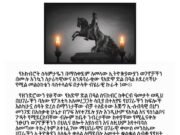Freedom now
Washington D.C.: In response to a petition filed by Freedom Now, the United Nations Working Group on Arbitrary Detention issued an opinion finding the detention of opposition politician Andualem Aragie by the Government of Ethiopia in violation of international law. The Working Group—an independent panel of five human rights experts from around the world—called for Mr. Aragie’s release.
“We welcome the Working Group’s opinion,” said Kate Barth, Legal Director of Freedom Now. “The Ethiopian authorities have repeatedly used the 2009 Anti-Terrorism Proclamation to silence legitimate political opposition members and government critics. Andualem Aragie is in prison because he dared to expose this injustice. We call on the Government of Ethiopia to respect the Working Group’s opinion and immediately and unconditionally release Mr. Aragie and his co-defendants.”
Mr. Aragie began his political career in 2000 as one of the founders of the Ethiopian Democratic Party. As part of the government crackdown following the 2005 elections, Mr. Aragie was imprisoned for more than two years at Kaliti Prison along with more than 200 opposition party members. He was released in 2007 under a general amnesty. After his release, Mr. Aragie founded the Unity for Democracy and Justice (UDJ) and again ran for parliament again in 2010.
On September 9, 2011, the UDJ, at the time the largest opposition party in Ethiopia, hosted a news conference where Mr. Aragie criticized Ethiopia’s overly-broad 2009 Anti-Terrorism Proclamation and admonished the Ethiopian government for its practice of imprisoning political opposition members under fabricated terrorism related charges.
In response to this criticism, Mr. Aragie was arrested on September 14, 2011 and over the next several weeks, the Federal Police detained several more opposition party members. Eskinder Nega, a prominent journalist, and another Freedom Now client, was also arrested in this crackdown. Ultimately, 24 individuals were charged as co-defendants, but only eight were arrested, the rest were tried in absentia. Authorities repeatedly and publicly accused the co-defendants of terrorism in the days and weeks following their arrests, although they were not formally charged.
On November 10, 2011, the men were charged with terrorism, treason, and espionage-related charges under the 2009 Anti-Terrorism Proclamation, the very law that Mr. Aragie had been criticizing. This was the first time since their arrests that the co-defendants had access to an attorney. After several delays, the trial proceedings officially began on March 24, 2012. The trial included serious irregularities. The primary evidence presented against the co-defendants was scratchy, nearly inaudible recordings of telephone conversations. The key evidence against Mr. Aragie was recordings of speeches he made at public meetings calling for peaceful political reform. Additionally, the government played a selectively edited video of comments made by the co-defendants.
On June 27, 2012, the court found Mr. Aragie and his co-defendants guilty and on July 13, 2012, the court delivered prison sentences for each of the seven men ranging from 16 years to life.
In its opinion, the United Nations Working Group found that the Government of Ethiopia had committed numerous violations of international law in arresting and detaining Mr. Aragie, including the denial of his rights to a fair trial, freedom of expression, freedom of association, and freedom to take part in public affairs and improper discrimination against Mr. Aragie on account of his political beliefs. The Working Group also condemned Ethiopia’s misuse of the Anti-Terrorism Proclamation to imprison government critics. In addition to affirming Mr. Aragie’s right to release, the Working Group stated that he should be compensated.

























